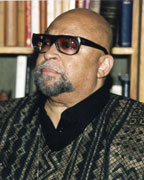| ||||||
By Dr. Maulana Karenga THE CIA, DRUGS AND GUNS: The Challenge of Struggle First, we must challenge the government. And we do this by first demanding and supporting a full investigation by an independent counselor or structure Cong. Maxine Waters has already initiated this process and it deserves maximum support. Second, we must call on the government to apologize publicly to the African American community for this immoral, illegal and deadly project. Thirdly, it must commit itself to a vigorous and effective treatment program for the victims of its deadly and disruptive drug and gun program. Clearly, it is a moral obligation to cure and compensate those who have been wilfully infected with disease or injured in any way. Also, the government must be called upon to increase in a meaningful way prevention programs. For the drugs and guns are still out there doing damage, destroying lives, families and communities. Also, we must challenge the government to change its unjust sentencing policy for crack cocaine as distinct from powder cocaine. This is not only because it is clearly unjust and racist, but also because of the government's role in pushing crack. Moreover, the government should also punish fully those involved in the drug and gun pushing by the CIA. And finally, it should put in place safeguards against the repetition of this. Secondly, the lumpen must be held responsible. The tendency of many activists is to honor the lumpen or criminal class once they confess. But the lumpen usually get religion only when they are caught. They can't claim "the devil made me do it and walk away without admitting responsibility and compensating in some meaningful way for the injury they've inflicted. Thus, the drug dealer knew he was dealing death, regardless how young when recruited. Afterwards, as he got older, he was even clearer about it. So he owes the Black community the rest of his life in service, helping to correct the wrong he's done, curing the illness he has infected people with, compensating for the ruin and wreckage he has heaped on the heads of Black persons, families and communities. Specifically, he must help expose and destroy the drug networks of his former colleagues. He has exposed some of them to cut a deal with the police. Let him stand up and expose them to the community and for the benefit of the community rather than himself. This is the minimum; the maximum is incalculable given the seriousness of the offense. Finally, the community must challenge itself. It must avoid simple delight in discovering conspiracies, comforting conversation about "I told you so" and episodic anger that evaporates at the next record release, sports play-off or similar spectacle. The established order counts on this and will of course always admit minor offenses to cover up major atrocities. Thus, the system, to save itself and its tattered honor, will sacrifice its servants and reveal thru investigation that which we already knew and at least suspected. But the key is to push past its intended goal of creating a myth of action thru media circus, legislative posturing, pretensions of shock, allegations of ignorance, church visits and other shapeshifting to facilitate escape of responsibility. We must use this issue to educate, mobilize and organize the masses of our people for the larger struggle for liberation and ever higher levels of human life. As Paul Robeson argued, "the battlefront is everywhere; there is no sheltered rear." And as Us teaches, we are our own liberators. A people that cannot save itself is lost forever. In fact, no matter how numerous or sincere allies are, those who would be free must strike the first, final and decisive blow. So no matter what the government promises under pressure, the struggle must continue to achieve it for a greater justice, a justice only possible in a radically restructured society of shared wealth and power. Moreover, Us teaches that the struggle is a long and difficult one, a costly and continuously internal and external battle. And as Maria Stewart says, "we are compelled to enter the field of action," but we must also recognize the magnitude and meaning of our struggle and commitment to it. In a word, as Amilcar Cabral says, "we must mask no difficulties, tell no lies and claim no easy victories." |
|
Copyright© 1999-2004 Us Organization, All rights reserved.
Reproduction in full or part is prohibited without permission
Last updated: 7/18/05


 The recent revelations
of the CIA's pushing drugs and guns in the Black community confronts
us with an important challenge. And we must avoid the tendency
to engage in episodic anger with the system and use the issue as
another ground of struggle. To do this we must pose three sets
of challenges, a challenge to ourselves, to the government and
the lumpen, i.e., the criminal class.
The recent revelations
of the CIA's pushing drugs and guns in the Black community confronts
us with an important challenge. And we must avoid the tendency
to engage in episodic anger with the system and use the issue as
another ground of struggle. To do this we must pose three sets
of challenges, a challenge to ourselves, to the government and
the lumpen, i.e., the criminal class.